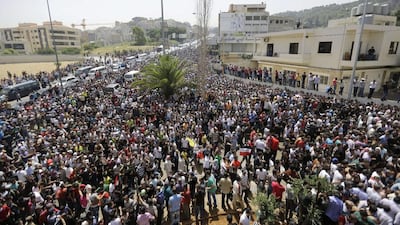YARZE, Lebanon // Hundreds of Syrians desperate to vote for president Bashar Al Assad tried to rush their embassy near Beirut on Wednesday, scuffling with Lebanese troops using batons and sticks to beat them back as voting abroad started ahead of Syria’s June 3 national election.
Tens of thousands of Mr Al Assad’s supporters flocked to the hilltop embassy in a town south-east of the Lebanese capital to cast ballots, snarling traffic outside, keeping schoolchildren trapped in buses for hours and forcing some schools to cancel scheduled exams.
“With our souls, with our blood, we will sacrifice for you, Bashar,” and “Long live Syria!” chanted many in the crowd.
Despite the carnage in Syria, Mr Al Assad has maintained significant support among large sections of the population, particularly among Christians, Alawites and other religious minorities. That support has been reinforced as Islamic militants gained more strength among the rebels fighting to topple him.
Mr Al Assad hails from the minority Alawite sect, an offshoot of Shiite Islam that has ruled Syria for the past four decades. The overwhelming majority of rebels are Sunni Muslims.
In Lebanon, a country of 4.5 million people that has long been dominated by its Syrian neighbour, the election turned into a massive show of support for Mr Al Assad and his Lebanese ally, Hizbollah.
Syrian opposition activists fighting to topple Mr Al Assad and their western allies have denounced the election as a sham since it is taking place amid a brutal civil war and is almost certain to give the 49-year-old president a third, seven-year term.
The government in Damascus, meanwhile, has touted the vote as the political solution to the three-year conflict.
Early voting for Syrians living abroad was to take place in embassies and consulates around the world where the staff has not defected to the opposition. Some European countries, including France and Germany, have said they will not allow Syrian expatriate voting to be held in their capitals.
The clashes in Yarze broke out when Syrian voters started pushing against the Lebanese soldiers in an effort to get into the compound. Soldiers beat the voters with batons and sticks and were even seen slapping a few people in an effort to control them. Overwhelmed by the crowds and the heat, several people fainted. Red Cross volunteers ferried at least 20 people away.
Polls in Lebanon were to be open from 7am to 7pm, but the Syrian ambassador in Beirut, Ali Abdel Karim Ali, said voting would be extended until midnight.
There was pandemonium inside the embassy as well. Voters pushed inside a small room with four ballot boxes and voted publicly. At times, election workers were seen grabbing the ballots and stuffing them inside the boxes themselves. No one appeared to be checking who was voting or how many times.
People began arriving at dawn, some on the back of pickups, others in cars and buses plastered with the Syrian white-red-and-black flag and pictures of Mr Al Assad. Many abandoned their cars to walk the last few kilometres to the embassy because traffic was at a standstill.
“I came to vote for president Bashar Assad because we love him and he is a good man,” said Abraham Dekermenjian, a Syrian of Armenian descent who fled from his war-devastated city of Aleppo.
There are about 1.1 million Syrians who live in Lebanon as refugees. Even before the Syrian war, Lebanon had close to a million Syrian workers who have lived in Lebanon for years.
Many among the refugees and opposition supporters abroad are expected to boycott the election. Two other candidates are in the race, but they are seen as mostly symbolic contenders and little known figures.
In Amman, Jordan, whose government has supported the rebels trying to topple Mr Al Assad, the picture was different. Dozens gathered outside the Syrian embassy to protest the voting. Some carried placards that read: “Anyone who votes has no morals.”
Also on Wednesday, the global chemical weapons watchdog said that members of an international fact-finding mission into alleged chlorine attacks in Syria were ambushed and briefly held by gunmen in rebel-held territory.
Releasing for the first time details of the chilling attack on its inspectors a day earlier, the Organization for the Prohibition of Chemical Weapons said a joint OPCW-United Nations convoy was first hit by a roadside bomb and then sprayed by automatic gunfire as it headed toward Kfar Zeita, a rebel-held village in Hama province some 200 kilometres north of Damascus.
After the lead vehicle in the convoy was severely damaged in the roadside bomb blast, the remaining vehicles turned around and headed for safer territory only to come under attack by gunmen in a built-up area, who sprayed the lead vehicle with automatic gunfire from close range, the OPCW said in a statement.
Occupants of two remaining vehicles “were briefly detained by some gunmen” but were released after intervention by Syria’s main opposition group, according to the OPCW.
The attack came despite careful preparations.
“The visit was subject to a rigorous security assessment and a local ceasefire had been carefully negotiated for the day with the government of Syria as well as with armed opposition groups in the area,” the OPCW said.
One driver sustained minor injuries in the attack. The team is now back in Damascus and vowing to continue its mission.
* Associated Press

